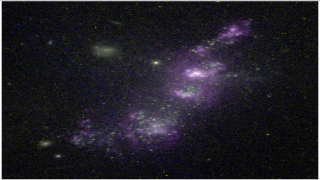Bibcode
Amorín, R. O.; Aguerri, J. A. L.; Muñoz-Tuñon, C.
Bibliographical reference
Formation and Evolution of Galaxy Disks ASP Conference Series, Vol. 396, Proceedings of the conference held 1-5 October, 2007 at the Centro Convegni Matteo Ricci, Rome, Italy. Edited by José G. Funes, S.J., and Enrico Maria Corsini. San Francisco: Astronomical Society of the Pacific, 2008., p.47
Advertised on:
10
2008
Citations
0
Refereed citations
0
Description
Based on the Sérsic parameters, obtained by fitting pixel to
pixel their deep optical galaxy images, the structural properties of the
underlying stellar host of a sample of 20 star-forming dwarf galaxies
have been analyzed. Our 2D technique has been improved to derive
reliable Sérsic models, such as the proper isolation of the
starburst emission, by using accurate masks in several steps. How the
host of a blue compact galaxy (BCG) relates with different types of
galaxies has been investigated by using diagrams built upon the
Sérsic parameters. H I gas masses and line-widths taken from the
literature have been used to compare the B-band luminosity, stellar, and
baryonic (H I gas+stars) Tully-Fisher relations for BCG hosts with those
for late-type disk galaxies.
Related projects

Starbursts in Galaxies GEFE
Starsbursts play a key role in the cosmic evolution of galaxies, and thus in the star formation (SF) history of the universe, the production of metals, and the feedback coupling galaxies with the cosmic web. Extreme SF conditions prevail early on during the formation of the first stars and galaxies, therefore, the starburst phenomenon constitutes a
Casiana
Muñoz Tuñón